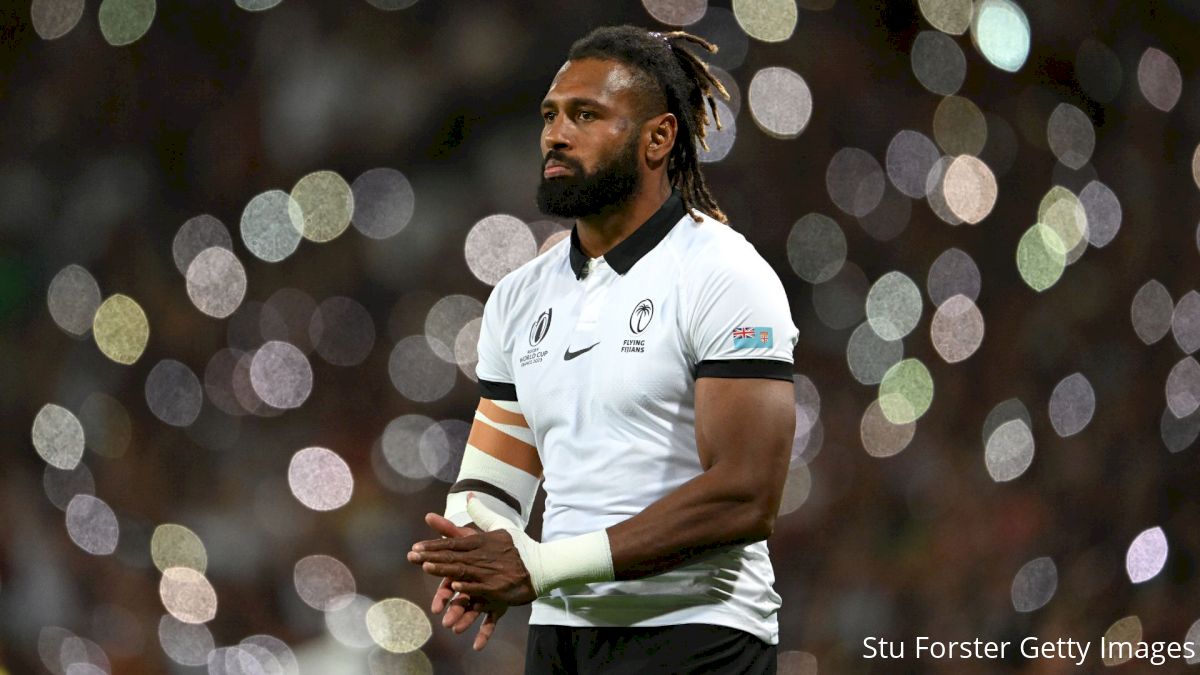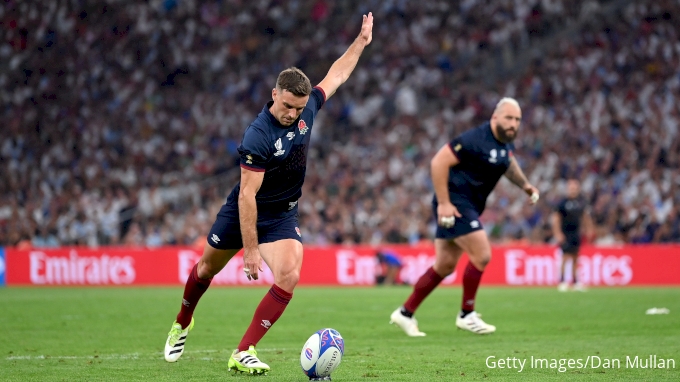Three Biggest Surprises From The Pool Stage At Rugby World Cup 2023
Three Biggest Surprises From The Pool Stage At Rugby World Cup 2023
Eight teams remain in the 2023 Rugby World Cup, but it wasn't a straightforward journey to get there, as these teams shined in pool play.

After a month of pool play at the 2023 Rugby World Cup, the stage is set for where legends are made in the competition: the knockout rounds.
It was a thrilling several weeks in France that featured multiple shocks and upsets, leaving just eight nations in contention to capture the Webb Ellis Cup. However, how we got to this point is a different story.
The pool stage wasn't as straightforward as past years might have been; a two-time world champion didn’t make the quarterfinals, for instance, while nations’ results ranged from losing in pool play for the first time, (like New Zealand did) to winning their first World Cup match at all (like Portugal did).
A few sides stood out and made waves when they were perhaps flying a bit under the radar. These are their journeys to escaping pool play and making it to the quarterfinals.
Here’s a look at three of the biggest World Cup surprises from the pool stage:
Fiji
Welcome back to the knockout rounds, Fiji — it has been a while.
The questionable ending to pool play aside, it’s still a massive achievement when any South Pacific nation makes it to the quarterfinals of the World Cup, and the Flying Fijians have exited the pool stage still playing in the competition for the first time since 2007.
Wales certainly deserves an honorable mention on this list for largely dominating Pool C after entering the World Cup on shaky footing, but it was Simon Raiwalui’s men who gave Wales its toughest match of pool play — and they arguably were unlucky not to beat it late after a spilt pass reception with the try line in sight in a 32-26 loss.
It was Fiji’s second match of the pool - against Australia - which solidified that this World Cup would be a monumental one in Fijian rugby lore.
The moment Fiji took charge 🔥#RWC2023 | #AUSvFIJ pic.twitter.com/MAkPJJeeh1
— Rugby World Cup (@rugbyworldcup) September 17, 2023
Fiji defeated the Wallabies in an epic 22-15 clash filled with drama, as the islanders were brilliant on the big stage in Saint-Etienne, defeating Australia for the first time in all competitions since 1954. It was the single most defining result behind the two-time world champion Wallabies missing out on the World Cup knockout rounds for the first time in the competition’s history.
Now, was Fiji’s pool stage perfect? Definitely not, and it nearly cost them.
Immediately after the Australia win, Fiji’s form began to dip, as it had to come back from a halftime deficit against Georgia to sneak out a 17-12 victory. Fiji then was stunned by Portugal 24-23 in the Pool C finale, as the Lobos picked up the first World Cup victory in their history, while Fiji had the dubious honor of being the first World Cup team to advance to the quarterfinals with just two pool-stage wins since France in 2011.
Fiji, level on points in the pool with the Wallabies, averted a disastrous elimination thanks to its win over them earlier in the tournament. Nonetheless, the South Pacific (and neutrals who love blistering pace in their rugby) can rally behind the Fijians now as loser-goes-home fixtures begin — and in a match involving Fiji, just about anything can happen at any given time.
England
Fiji’s opponent in the quarterfinals Sunday will be none other than England in Marseille, which is a bit ironic from an English perspective.
That’s because England’s final World Cup warm-up match came against Fiji at Twickenham, and the islanders went to London and beat the English 30-22 in an epic victory. It was amazing for the visitors but a miserable result for coach Steve Borthwick and his squad, with the tenure of the former national side’s captain already on a downward trajectory since he was hired to succeed the sacked Eddie Jones in late 2022.
Even with a favorable Pool D, where most considered it the favorite to top the table against Japan, Argentina, Samoa and debutants Chile, there was the looming thought that England could perhaps crumble under the dysfunction and crash out of the pool stage much like it infamously did during its home World Cup in 2015, a thought made worse by the fact that captain Owen Farrell was out for the critical first two fixtures against Los Pumas and the Brave Blossoms due to suspension.
Alas, England did something that perhaps surprised even many of its own supporters — it outperformed many expectations and looks dangerous heading into the knockout stage.

George Ford’s kicking masterclass (9-for-9) led England to a crucial 27-10 win over Argentina, and then England held giant-killer Japan without a try in a 34-12 victory in which the English largely cruised.
England easily wrapped up quarterfinal qualification thanks to a 71-0 demolition of Chile in which Henry Arundell scored an eye-popping five tries, and though England looked sloppy against an inspired Samoa in its 18-17 come-from-behind finale, it was a win (one in which Farrell became the country’s all-time leading points scorer, too) and a perfect 4-for-4 in the pool stages.
With a chance to rectify the Fiji defeat, as a ticket to the semifinals is on the line, will England utilize the momentum it gained in the pool stages to make another deep knockout run at a World Cup?
Ireland
Wait, Ireland is the No. 1-ranked side in the world and has been for quite some time. Why exactly was its showing in Pool B (in which it topped the group on 19 points) surprising?
It’s because Irish rugby’s history at the World Cup is filled with failure on the big stage and plenty of disappointment.
With its performances in what many considered to be the “Pool of Death” at this year’s World Cup, perhaps Ireland — finally — is on track to buck the trend and shine on the grandest occasion in international rugby.
Ireland had no trouble in its first games of the pool against Romania and Tonga, but everyone had their eyes on Ireland’s titanic showdown with reigning world champion South Africa on Sept. 23 at the Stade de France. It was the match many considered to be the one that, if Ireland got through it, it would have earned the right to be considered favorite to lift the Webb Ellis Cup — and coach Andy Farrell and his team did not falter.
Paris erupts for Mack! 😍#TeamOfUs pic.twitter.com/39pd3QaNX5
— Irish Rugby (@IrishRugby) September 24, 2023
In a match that lived up to the hype and had the feel of a final (and actually could be the final if Ireland and South Africa both make it that far in the knockouts), Ireland capitalized on the Springboks’ heavily publicized biggest weakness (kicking off the tee) and ground out a tense 13-8 win, passing its litmus test and making noise across France for its showing.
The 36-14 bonus-point closer against Six Nations rival Scotland merely was the exclamation point, and even in the toughest pool in the competition, only France and New Zealand had a better scoring differential at the end of the opening round than Ireland’s +144.
The next task for Ireland — get past the quarterfinals for the first time — is the big one, and against the All Blacks after they romped through the remainder of Pool A after an opening loss to host France, Ireland will have to show, like it did against South Africa, that this is a different Irish team than years’ past.
One who can win the whole thing and return home from France as world champions.